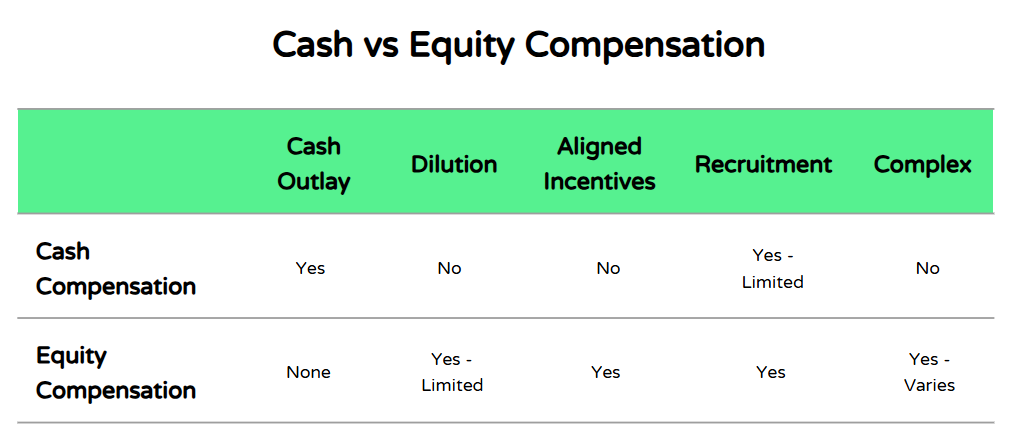Equity Compensation: A Tool for Talent and Growth

The practice of offering ownership in a company as part of an employee’s total compensation package is known as equity compensation.

Equity compensation has become a cornerstone of startup and growth-stage companies.
It’s a flexible, performance-aligned way to attract and retain top talent while preserving cash. Understanding how equity compensation works will help companies align their employees by giving them a stake in the future success of the business.
What Is Equity Compensation?
Instead of paying in cash alone, companies grant instruments like stock options, restricted stock units (RSUs), or performance shares. This structure fosters a sense of shared ownership between employees and shareholders, creates a powerful retention tool through vesting schedules, and attracts high-performing candidates without overextending cash reserves.
There are several common forms of equity compensation, each with its own mechanics, tax implications, and accounting requirements:
- Stock Options give employees the right to buy shares after a vesting period and at a fixed “exercise” price, which often is below the market price, allowing the employee to participate in upside.
- Incentive Stock Options (ISOs) are a type of stock option available to employees, which offer favorable tax treatment if certain conditions are met—although they may trigger Alternative Minimum Tax (AMT) implications.
- RSUs (Restricted Stock Units) and RSAs (Restricted Stock Awards) grant shares outright but subject them to vesting criteria, typically after a set period of time or certain conditions are met. RSUs represent a promise to deliver shares later, whereas RSAs typically come with ownership at the time of grant but with limitations on when they can be sold.
- Other vehicles include Performance Shares, Phantom Stock, Employee Stock Purchase Plans (ESPPs), and Stock Appreciation Rights (SARs), each tailored for different performance goals, employee levels, and liquidity scenarios.
When Does Equity Compensation Make Sense?
Equity compensation allows startups to compete with larger firms that can offer higher base salaries. This not only conserves cash but pulls in individuals who take ownership of their work because they’re motivated by long-term outcomes.
It’s also a smart move before high-stakes events like fundraising or acquisitions by aligning incentives across executives, board members, and employees.
However, it's not without trade-offs. While cash compensation is simple and won’t dilute ownership, equity compensation will create dilution for existing shareholders. It also adds administrative complexity and accounting considerations. That said, many companies reserve up to 20% of their capitalization table for future hires—viewing equity as both an investment in talent and a lever for future growth.
What Should Finance Leaders and Founders Consider when it Comes to Equity Compensation?
General Administration
- What type of equity plans are in place (ISOs, RSUs, SARs)?
- Is a cap table management tool like Carta being used, or is the legal department manually managing it?
- Have Form 3921s been filed for ISOs exercised last year?
- Do employees understand the tax implications of exercising their options?
- What options are tied to performance milestones versus time-based vesting?
Accounting and Valuation
- Has a recent 409A valuation determined the FMV of common shares?
- What are the key assumptions in any waterfall or cap table models (e.g., exit price, participation thresholds)?
- What method is the company using to calculate stock option expense?
Events like audits, raises, or exit scenarios often spark deeper analysis and planning around equity compensation. Being proactive keeps companies compliant and means employees can realize the full value of their awards.
What Are the Accounting Complexities for Equity Compensation?
Unlike traditional salaries, which are expensed when paid, equity awards are typically expensed over their vesting period based on fair value at the grant date.
The method of accounting varies depending on the form of equity—but the goal remains the same: to properly recognize the cost of compensating employees with ownership.
Stock Options
For stock options, no journal entry is required on the grant date. Instead, the fair value of the options is determined and recorded as a compensation expense over the vesting period. As the options vest, companies recognize a portion of the total expense each month or quarter.
When employees exercise their options, the company receives cash equal to the exercise price and records the issuance of new shares. If options expire or are forfeited before vesting, any previously recorded expense may be reversed, and Additional Paid-In Capital adjusted accordingly.
RSUs and Other Instruments
With RSUs, the accounting is slightly different. Because employees aren’t purchasing shares, no cash is received, and the entire fair value of the shares is recorded as a compensation expense over the vesting period. Upon vesting, shares are issued and the value is reclassified.
Other instruments like performance shares, SARs, and phantom stock follow similar logic but may require revaluation if tied to performance metrics or market conditions. These require more advanced modeling and, often, collaboration with legal and compensation advisors.
Form 3921 Compliance
If employees exercise Incentive Stock Options (ISOs), companies must file Form 3921 with the IRS. This form tracks the grant date, exercise date, exercise price, fair market value on the exercise date, and the number of shares exercised.
Final Thoughts
While equity compensation can certainly recruit top talent, it’s not a “set it and forget it” tool—it requires careful planning, continuous management, and alignment across legal, finance, and HR functions. Companies must balance the benefits of recruitment, retention, and alignment with the realities of dilution, compliance, and cost.
A successful company will treat equity not just as a perk, but as a foundational part of its compensation philosophy and financial strategy. By understanding the mechanics and asking the right questions, founders and finance leaders can build equity programs to serve both the company and its people.
If you need help designing or managing your equity compensation plan, please reach out.

.jpg)
.png)
